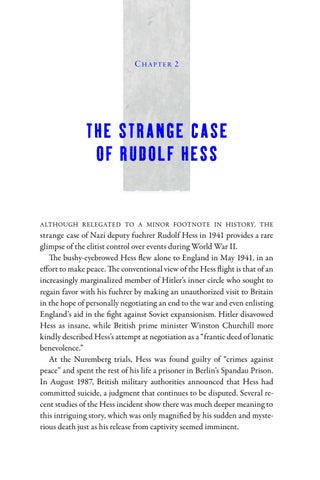C HAPTER 2
THE STRANGE CASE OF RUDOLF HESS
ALTHOUGH R ELEGATED TO A MINOR FOOTNOTE IN HISTORY, THE
strange case of Nazi deputy fuehrer Rudolf Hess in 1941 provides a rare glimpse of the elitist control over events during World War II. The bushy-eyebrowed Hess flew alone to England in May 1941, in an effort to make peace. The conventional view of the Hess flight is that of an increasingly marginalized member of Hitler’s inner circle who sought to regain favor with his fuehrer by making an unauthorized visit to Britain in the hope of personally negotiating an end to the war and even enlisting England’s aid in the fight against Soviet expansionism. Hitler disavowed Hess as insane, while British prime minister Winston Churchill more kindly described Hess’s attempt at negotiation as a “frantic deed of lunatic benevolence.” At the Nuremberg trials, Hess was found guilty of “crimes against peace” and spent the rest of his life a prisoner in Berlin’s Spandau Prison. In August 1987, British military authorities announced that Hess had committed suicide, a judgment that continues to be disputed. Several recent studies of the Hess incident show there was much deeper meaning to this intriguing story, which was only magnified by his sudden and mysterious death just as his release from captivity seemed imminent.




